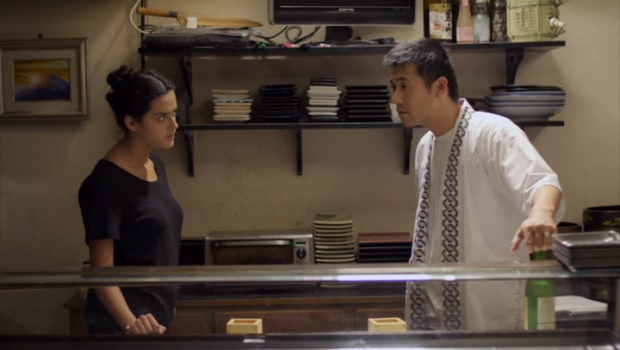East Side Su-She
For centuries, in seemingly, ever country, male dominance has been at the forefront of every society. Many cultures to this day, hold steadfast to the past treatment of women as inferior, and less than. In our more modernistic world, women have broken down stereotypes, not only in the workplace, but also on the home front. Today, thanks to the women’s liberation movement and forward thinkers, there are few arenas where that form of discrimination holds true. However, there are still bastions of culture where old world ideology reigns supreme. As “westernized” as Japan seems on the outside, you’ll find many traditions have continued to flourish and linger. The “battlefield” in this film conversation is in the kitchen.
East Side Sushi is the story of a Latina woman’s quest to be a sushi chef in a Japanese restaurant where only Asian men hold that title. Juana finds herself without work when her food kiosk breaks down and she’s left to figure out how to support her family of three. An opportunity opens up at a Japanese restaurant for a sous chef in the back kitchen. This is where she encounters her first obstacle. After cooking Latin cuisine her whole life, she is now being hired to prepare Japanese food, something she knows nothing about. At this point, the film begins to tell a story about someone trying to provide a better life for her loved ones, but there’s more- much, much more.
As the movie progresses, Juana realizes she can do more than what is tasked for her in the kitchen. She watches the sushi chef’s technique and attention to detail, and is intrigued. She looks to better herself by becoming a sushi chef without knowing the obstacles she’ll have to face. They perform their skills in front of the guests, a tradition that has been a cultural privilege preserved for Asian men for centuries. What is not traditional is having women perform these same tasks. Now the film takes us into another world where discrimination rears its ugly head. We go from not only telling the story of one woman’s struggle to provide for her family and her attempts to better herself; into the realms of the film educating us on how our diversity can be affected by discrimination.
In an article “Why Are There No Female Sushi Chefs?”, December 1, 2015 by Alia Akkam, it is articulated how traditional ways and stereotypes have made it difficult for women to thrive in this specialized culinary culture. Akkam mentions in her piece of the 2011 hit documentary, “Jiro Dreams of Sushi” profoundly and artfully illuminates how a hard-working master sushi chef catapulted his tiny 10-seat restaurant in a Tokyo subway station into a mecca for coveted $300 tasting menus. Diners across the globe making pilgrimages to Sukiyabashi Jiro might take note of the flowing green tea and 45-minute massaged octopus, but not the females painstakingly working behind the counter. There are none — and save for a poignant transformation in thinking about gender roles, there never will be.
Earlier this year a Business Insider article brought to light a four-year-old quote by Jiro Ono’s son in a Wall Street Journal feature. When asked why there were neither female chefs nor apprentices at the famed restaurant, he matter-of-factly responded that it is “because women menstruate. To be a professional means to have a steady taste in your food, but because of the menstrual cycle, women have an imbalance in their taste, and that’s why women can’t be sushi chefs.” This rationale, along with an equally ridiculous stigma about females’ slightly warmer body temperature, shows how sushi is woefully behind the rest of the kitchen world when it comes to gender equality”. Facing this kind of sexism is hard enough. Juana however, encounters even more discrimination.
Juana is not an Asian man, nor is she an Asian woman; she in a Latina woman. This movie continues to teach us about the many obstacles people of color have to face daily. But it also teaches us that no matter the obstacles placed in our way, it doesn’t mean we give up on our dreams or ourselves. Overcoming all the junk that is supposed to knock us down is who we are and what we do. Diversity is not a curse, it’s a privilege.
For me, East Side Sushi is a good movie, worth seeing not just for general entertainment, but more for the importance of being the best you can be, and having the courage and drive to do that in a world which is still behind the times.
Gregory B. Morgan







